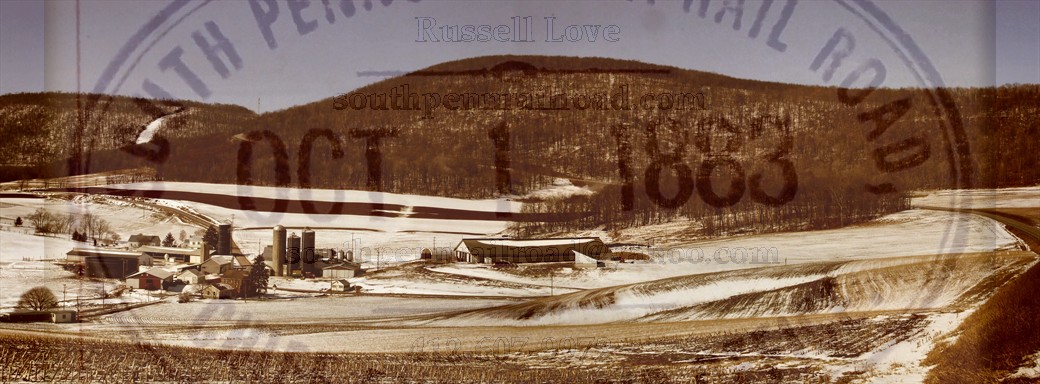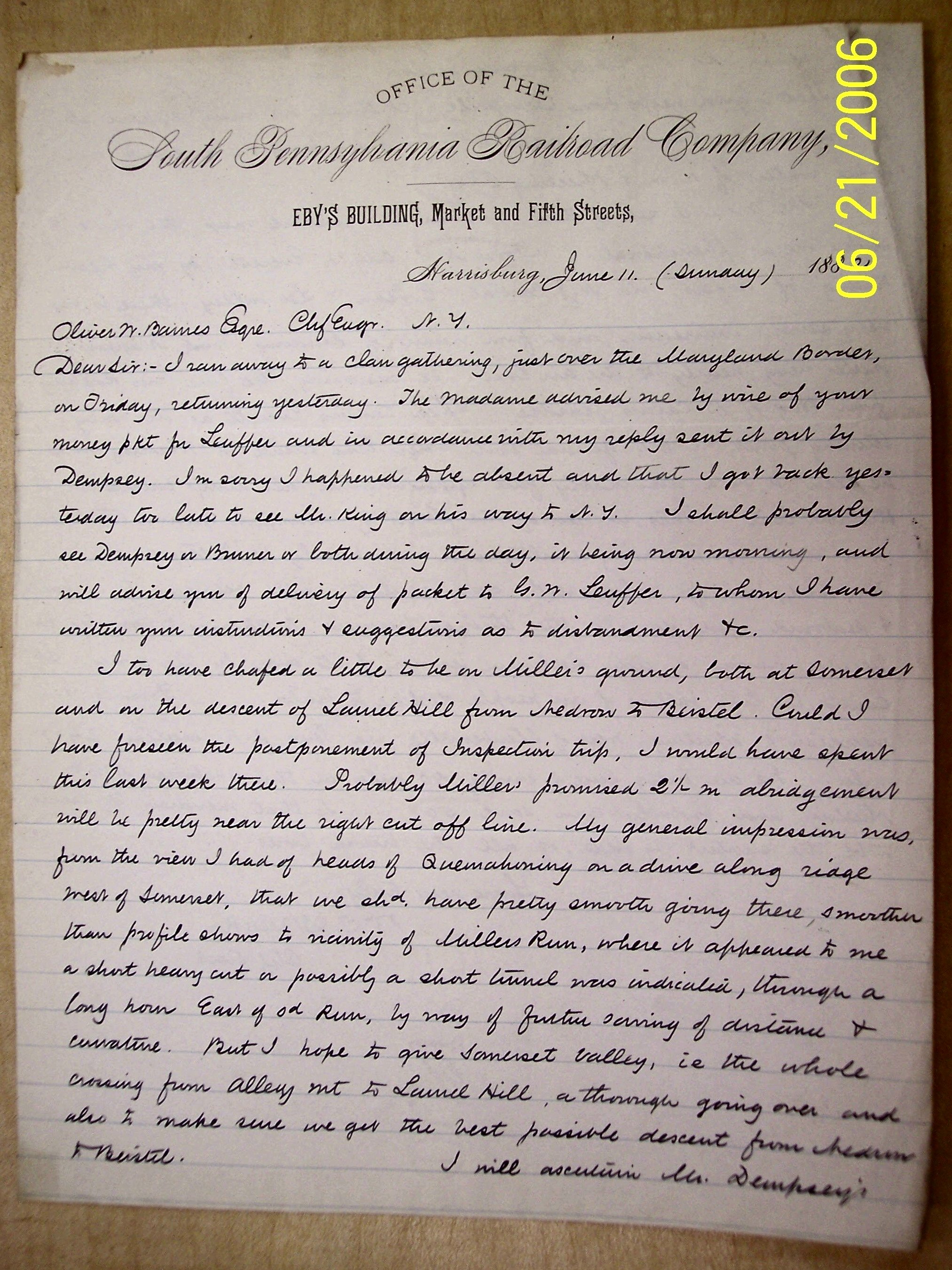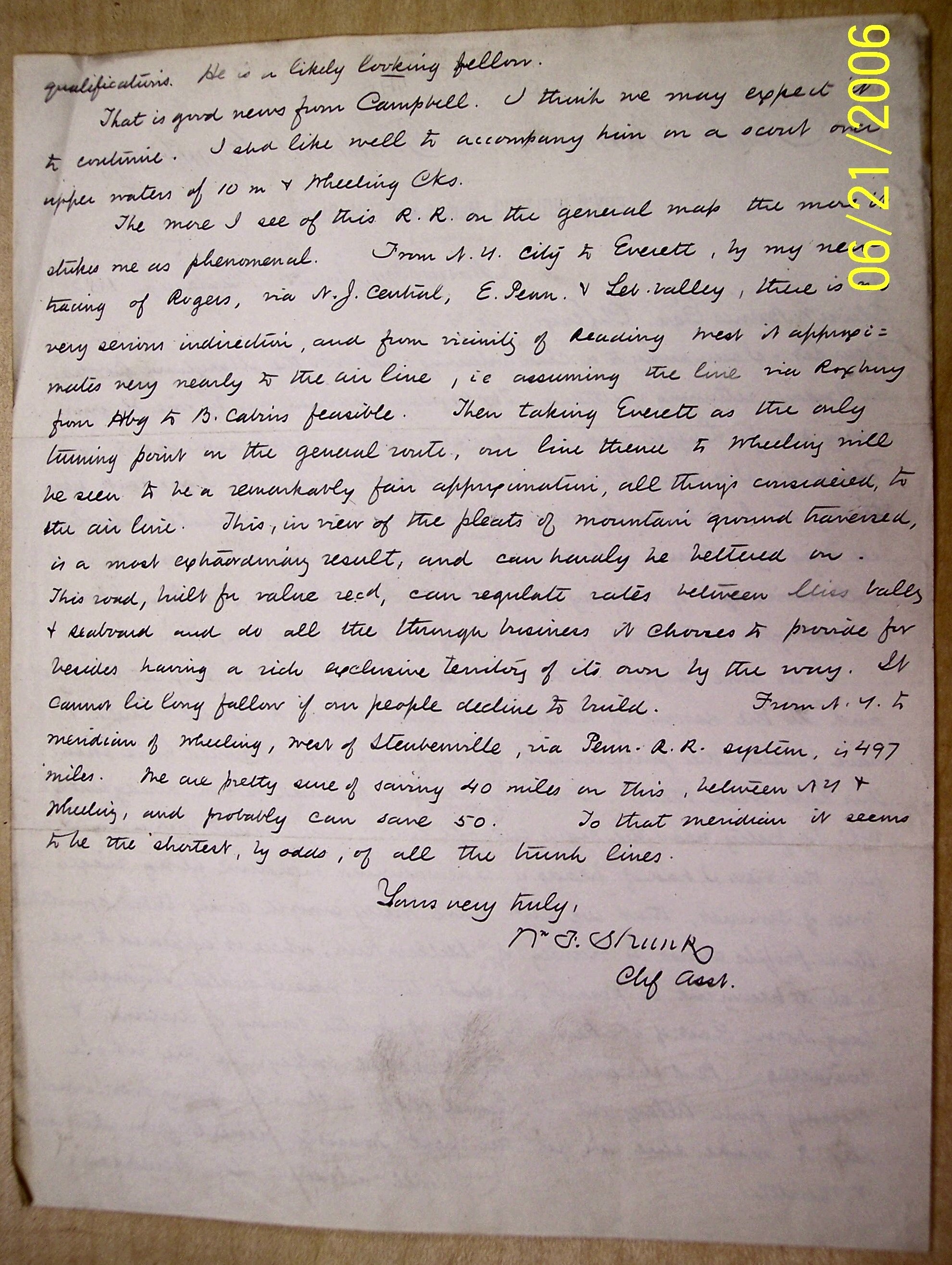The South Pennsylvania Railroad

Above: In this small farm was once the Dividing Ridge, South Penn Railroad Headquarters.

The Phenomenal Railroad
by Russell Love
Want to talk about it? Click on this button!

South Pennsylvania Forum

It
has
now been fifteen years since I began researching the South
Pennsylvania Railroad and I can honestly say it has been one great
ride. I can
barely recall the first sighting but indeed I do. It was the grade
leading from
the Quemahoning Tunnel at the 106.3 mp. just west of Somerset along the
Pennsylvania Turnpike. Since that time I have driven by that sight and
think
back to that day and just think to myself at what a research project it
has
been since. The many things I have learned between that day and now as
I write
this page still amazes me. It was on a curve traveling west and just
off to the
right that I could see the large railroad fill headed off towards the
distant
hills using the natural contour of the landscape to gain elevation to
reach the
next mountain it would have to conquer as the Pennsylvania Turnpike
choose to
go it alone along a more steeper grade. It was here that I knew this
incomplete
route was going to be mine for the duration to discover and bring out
to many
people who wanted to know more of what they had heard about but could
not get
the whole truth of where the route was really to be built. Like others
I had
heard about this un finished railroad but just assumed the Pennsylvania
Turnpike utilized all of it and that nothing else was left of it. But
just
finding that one section gave me hope that if I did find that one spot
of grade
still standing in the Pennsylvania woods that maybe, no matter how
little was
left I wanted to see the rest of what may be still out there. And like
me what
your about to see will surprise you in that most of what was built
still
exists.
On
another trip just
fresh into spring of 1996, I drove with my wife who often
went with me but didn't really care for the line/hobby but loved the
country
views, when we stumbled upon the dedication ceremony at the New
Baltimore
covered bridge site which recently had just been replaced after a flood
washed
the original bridge away. Here I met a man who told me to seek out a
local
councilman who had a copy of the Pennsylvania Turnpike's planned route
on a
topographic map they provided to him. It was a map that showed how the
Turnpike
had plans to do away with the present Allegheny Tunnels. The councilman
showed
me the map and almost instantly I spotted the un mistakable changes in
the
contour lines that were man made grades of a railroad. I was searching
for the
grade to be down Deeters Run but it was actually being built down Three
Lick
Run. That same day the councilman even drove us to our first real South
Penn
site at the Benning Road crossing off Tunnel Road. What a site it was
standing
on the partially built grade/fill above the valley which was under
construction
some 116 years ago. It was never completed and for my first time I
actually saw
stone work that stone cutters were working on when building a culvert.
It to
was not complete. Driving down into the valley for a closer look, it
showed two
box like openings which were being built to allow creek water to freely
pass
beneath the future fill that for obvious reasons as the culvert was not
completed was not filled across the valley. This incomplete culvert
showed how
such care was given to this construction that even the floor of the
creek was
attended to by laying stones in the creek sideways to make erosion of
the creek
bed almost non existent. These were great builders and more of their
work
needed to be looked at. That was a great day for my first find on the
great
east slope of the Allegheny Mountain. After seeing that sight I wish I
had more
time that day to see more. I knew there had to be more. I was now on
track to
one of the best history sights I would ever get involved in.
The
research of the
railroad was not overwhelming nor was it just dumped on me
either. I started out from those two examples above that there must be
more and
I wanted to see it all. At first I was looking for all the work sites I
could
find. I recall getting off work sometimes and even though it would get
dark
soon, I still took some jaunts down the line to seek out areas where I
believed
I could find more sites. Even to the point that I would chance guessing
where
they would have built it in places they never began work. Oddly
enough
later on that I would be correct in my guessing of those sites.
Once
I began to get
the worked on sites documented. I was beginning to get the
feeling that I wish I had more to go on. That came quickly as I was
giving a
showing one time at the Sideling Hill Plaza east of Breezewood and a
man
chanced by who told me he was amazed anyone was even interested in that
old
railroad especially since it wasn't completed. He told me of a site
that he
thought I would be interested in located atop the Allegheny Mountain
south west
of the east portal of the Allegheny Tunnel. He told me it was a quarry
that was
worked on by the railroad. His name Robert Long (ret. Pennsylvania
Turnpike
right of way department). His information now sent me looking for more
quarries
after I found that site he recommended.
The
Pennsylvania
Turnpike
A special thanks to some very
special people I know there. The Turnpike in
general say they are not interested in the history any longer but some
I met
seem to show forward some of that enthusiasm and pride of its past but
for the
most part they keep it under wraps. I can sense that in the few workers
I have
talked to and believe I sense that you can't work there without caring
about
the turnpikes past. When I show up with some of my findings they are
very glad
that someone is keeping the railroad alive. I am always proud to be on
the
outside yet still believe I am welcome when I do call. I don't get the
feeling
of Russ were busy call later. Another way to put it is that I am the
thin
thread between their past and what they are today.
What gave me the
most satisfaction and joy was actually finding where the grade
was to be built in places they never began work on. Places like the
west shore
of the Susquehanna River to the beginning work site at the east end of
the Blue
Mountain Tunnel site. That is a great site to explore but my favorite
is the
area between the Everett golf course and the grade that begins just
west of New
Baltimore. I take people on tours and show in hand proof where
the grade
was to be built. It's like I am the field manager showing
subordinate's where
to build as the surveys were already done and their work is mine to
continue
on. Out of the survey hands and now into construction phase.
Actually finding the unfinished work sites such as culverts, cuts fills and even the stone quarries was great but what interested me more was the never started sites. The long stretches of virgin countryside which had no trace of railroad work. One place as mentioned above is the Bedford area. The work ended just at the tip of land south of the Everett Golf course where the grade was to cross the river but never got to that. Well from that point it is almost twenty five miles of non documented sites which I was able to place where the grade was to be built. About five years after I began researching the route I stumbled upon where to acquire the maps of the railroad and soon acquired them for study. They are very well detailed and provided many landmark sites such as houses, creeks, barns, roads and even mountains that show where the line was to be built. I soon went out looking for those structure type landmarks to show exactly where the line should be built. The maps even showed alternate survey lines. WOW what fun looking for those sites. Some of the worked on grades were actually built but were covered over or plowed down by farmers. I know of at least three favorite spots where the grade can still be seen under proper lighting that show through. As much as they tried I am able to see the ghost mounds even to this day. Even one farmer has been destroying culverts and traces of the work still can be found. Not for shy people. The South Pennsylvania Railroad is not for shy people. I thought I could get lost in this hobby and that I would not want to be involved with speaking to people. The problem with that is that to gain access to most of these sites you need to ask permission to access properties. That means TALKING TO PEOPLE. Soon I found that I was slowly doing what I never wanted to do. I recall in high school when you had to stand up in front of the class and read your report. You all remember that time don't you? Well fortunately I never did. Whew! But life was not to be that way for me. I wasn't going to get out of talking to people that easy. To get to the point, I have done some impressive shows that I try very hard to make others see what I have found. You don't do that being shy. Now I am anxious for people to get to learn the deep history about this railroad and its connection with the Pennsylvania Turnpike.  
Above: Pay particular attention to the top of the second page as this is one of the most liked quotes by me of the view of the South Penn route written by W. Shunk, Chief Field Engineer of the South Pennsylvania Railroad several years after he was hired and thought the whole idea was not feasible. Well you get to see now why I have a great feeling for this hobby. It doesn't disappoint, it always is productive. Its the perfect railroad to learn how a railroad being built in the early time of our country teaches you how they built them. For a $1.25 a day men worked eight hours a day (documented) to take care of their families. They literally flocked by train and walked over mountains to reach these sites for work. Hundreds of men. Three shifts worked day and night to get this work done. They were proud men and when the work was suddenly stopped they were truly and rightfully upset. Some said this was to be one of the best routes to be built and disappointed that it was stopped. Even the chief field engineer was said that when he first heard of such a route to be built that he was to survey was said to be in disbelief that such a route was even thought of or planned for. But his view was totally different once he had the route on paper. He summed it up by describing this route in the following word. Phenomenal! |